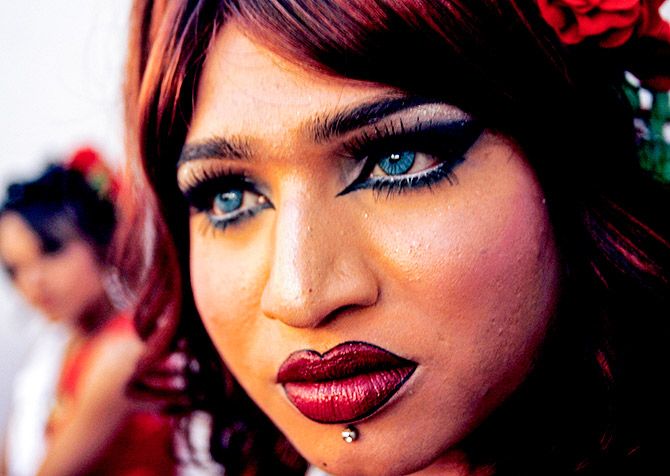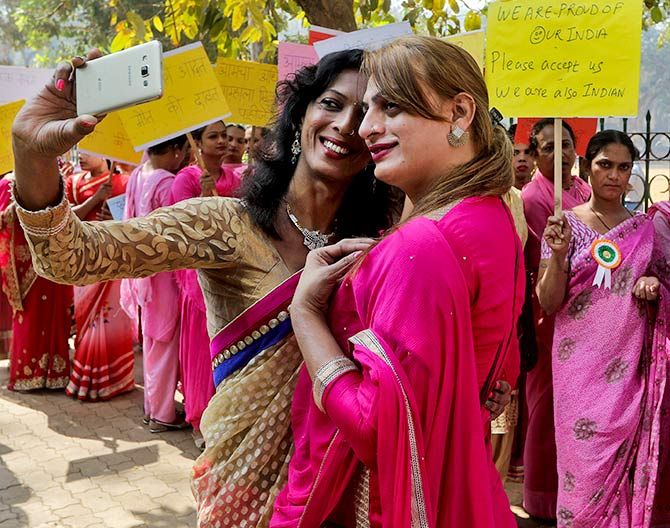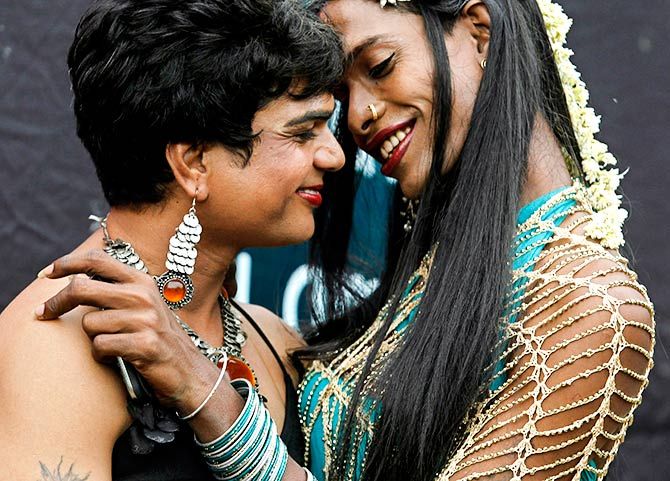'It is high time the government of Kerala stops appointing policemen without teaching them the IPC.'

IMAGE: A transgender participates in a beauty contest. Kindly note: Image posted only for representational purposes. Photograph: Arko Datta/Reuters
On January 5, the Kerala police arrested four transgenders from a lodge in Kochi. They were charged with operating an online sex racket and also slapped with Article 377.
After one of the transgenders attempted suicide in police custody, the transgender community in Kerala has come out loudly against police harassment.
Chapter XVI, Section 377 of the Indian Penal Code, dating back to 1861, a law incorporated by the British when they ruled India, criminalises sexual activities 'against the order of nature'.
The Supreme Court has now decided to review this archaic law.
Renju Renjimar, a transgender activist and make-up artiste in the Malayalam and Hindi film industries, speaks to Rediff.com's Shobha Warrier about the need to abolish Article 377 and educate the police.
Do you think the Kerala police has been harsh with the transgender community?
What the Kerala police urgently need is education about the Indian Penal Code.
It is high time the government of Kerala stops appointing policemen without teaching them the IPC.
Those who work for the police, which is a law enforcement agency, should have sexuality and gender-based awareness but these people do not have it. As long as they don't, they will continue to harass the transgender community.
Do you think this kind of outlook is a reflection of Kerala society itself?
I do not want to blame the entire society for the unjust behaviour of the Kerala police.
But I have to say that a large section of Kerala society -- including high-level officials, policemen, doctors, teachers and many such educated elite -- is unaware and intolerant towards our community.
This is because these people do not have any idea about who transgender people are.
It is this ignorance which makes them slap such cases on us.

IMAGE: 'Till they understand the community, till they accept us as part of society, this kind of harassment will continue,' says Renju Renjikumar, seen here at work. Photograph: Kind courtesy Renju Renjikumar
Whose responsibility is it to educate such people, especially those in the police force?
The responsibility lies with the government.
Unless the government conducts classes and seminars on the transgender community for both junior and senior policemen, this attitude is not going to change. It is high time the government does this.
I have a question to ask Kerala society: Why do they look at the transgender community as just sex workers?
The transgender community do not do sex work in front of the houses of these people; in fact, people come in search of transwomen.
Look at what happened in Kochi.
The transwomen were arrested alleging a sex racket, but what kind of sex are they talking about when there was no man there?
Then they were slapped with Article 377 so that they would not get bail.
Do you mean the police did this to harass the transgender community?
Yes, it was a planned move.
Till they understand the community, till they accept us as part of society, this kind of harassment will continue.
You spoke of the need to educate the police about gender and sexuality. What about imparting such education to the media?
I am sorry to say those in the media also are ignorant.
It is through the media that the general public come to know about so many things.
Unless the media is educated and unless they understand the truth, the right information will not be passed on.
If the general public is unaware about the transgender community, the media has to take the blame.

IMAGE: 'If your own family accepts you with love and affection, society will not point fingers at you,' says Renju. Photograph: Shailesh Andrade/Reuters
It was reported that many transgenders migrate to Tamil Nadu which, unlike Kerala, is comparatively tolerant towards the community. Is this true?
To some extent, it is true that Kerala society is intolerant towards the transgender community.
The first step has to be taken by the family. Parents have a responsibility to accept a child who is different.
How do you expect society to accept you when your own family disowns you?
Do you think society will embrace you when your own parents drive you away from home?
If parents push you away from home, society also will push you away from the community.
If your own family accepts you with love and affection, society will not point fingers at you.
Why do you think the police harass us? It is because they know we do not have anybody to support us.
Society looks at the transgender community only as sex workers. Don't you think you have to make an effort to change this image?
You have to understand that these people are driven away from home as children and, hence, have not been able to complete their education.
Nobody gives them any job and, if at all they do get one, they are sexually harassed at work.
That's why they look at sex work as the only way to feed themselves. Can you blame them for this?
You should understand that nobody would like to be a sex worker; only those who are pushed against the wall do it.
Here, they are isolated by their family and society. They have no other option; they become sex workers in order to survive.

IMAGE: 'It is my freedom and choice to have sex with whoever I want and I do it in the privacy of my bedroom. Nobody has the right intrude into this private space and tell me what I should and should not do,' says Renju. Kindly note: Image posted only for representational purposes. Photograph: Danish Siddiqui/Reuters
Some states are more accepting of transgenders than others. Why?
Years ago, you saw transgender people only in Mumbai, Chennai, Hyderabad and Bengaluru. You would not have seen one transgender person in Kerala.
Today, there are more than 35,000 transgender people living in Kerala.
In 2014, the Kerala government came out with a policy for transgender people.
We thought our lives would change after this. We thought we would get more job opportunities and the freedom to live openly.
But it was not to be.
From 2015, we saw a different scenario. We were looked at as people some policemen could do anything against.
When the police crucified us and harassed us cruelly, the government refused to warn or punish them, which led to others in society also harassing us.
I request the Pinarayi sarkar (Pinarayi Vijayan government in Kerala) to warn those in the police force who are harassing us.
As long as the government is silent about this, we will continue to be harassed.
When the Kochi Metro gave employment opportunities to the transgender community, it was widely appreciated...
Though it has been trying to take credit, the government of Kerala had nothing to do with the Kochi Metro giving jobs to people from our community.
When 11 transgender people were arrested by the police, we had organised a protest march saying that, until we had jobs, we would live doing sex work.
That was when the police commissioner and the collector of Kochi spoke to the Kochi Metro authorities and a decision was taken to employ transgender people there.
It was not an act of charity by the government.

IMAGE: 'I am optimistic. I am hopeful that the Supreme Court will do away with Article 377,' says Renju. Photograph: Kind courtesy Renju Renjikumar
You spoke of harassment by the police. Do you think having an archaic law like Article 377 has become a weapon for the police to use against you?
Look at the irony; the country (Britain) which introduced this law to India abolished it in its homeland more than 50 years ago. But we are still clinging on to it.
Who gives the Indian government the right to dig it up and enforce it?
Let the country come out with a law to protect its women first and then talk about enforcing a law that the whole world has abandoned.
Are you optimistic now that the Supreme Court has decided to look at Article 377 again?
I am optimistic. I am hopeful that the Supreme Court will do away with Article 377.
Our society has to accept the right of its citizens to have some privacy in their lives.
Here, you are talking about two individuals who are adults and what they do in their private space.
It is my freedom and choice to have sex with whoever I want and I do it in the privacy of my bedroom. Nobody
has the right intrude into this private space and tell me what I should and should not do.
What has the public got to do with what I do in my bedroom?
As long as I am not creating any nuisance in any public space, the law enforcement authorities have no right to curb my freedom.
Do you think abolishing Article 377 will put an end to the kind of harassment the transgender community faces from the police in Kerala?
It is not a question of using Article 377 as a weapon against us.
As long as there is no awareness, the harassment will continue. They will find some other weapon to use against us.










 © 2025
© 2025